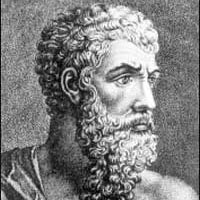Aristophanes - Biography and Works
Aristophanes was born in 448 B.C. and was supposed to die in 388 B.C. Aristophanes was the son of Philippus, of the Deme Cydathenaus. It was uncertain where he was born. He was a contemporary comic playwright of Socrates and Thucydides. They all were the next generation of Sophocles and Euripides. Aristophanes started to write his comedies after the rise of democracy in the Athens.

Aristophanes (448BC-388BC)
He had written nearly forty plays, but unfortunately only eleven plays have survived for the modern readers. Some of his important surviving plays are The Acharnians (425 BC), The Knights (424 BC), The Clouds (423 BC), The Wasps (422 BC), Peace (421 BC), The Birds (414 BC), Lysistrata (411 BC), The Frogs (405 BC) and Wealth II (388 BC). It is recorded that he had won several competitions. He was such a prolific writer that he could write ten plays in a year, but the number decreased down to six at the time of the Peloponnesian War.
The people of Athens were depressed by the ongoing conflicts of the Peloponnesian War. Moreover, the loss of their greatest hero, Pericles, added much sorrow to them. Pericles was replaced by corrupt politicians such as Cleon and Hyperbolus. People were not satisfied with them.
From the beginning, Aristophanes comedy is marked with tones of fear and pain. Aristophanes' The Banqueters and The Babylonians have been lost which were his first two comedies. Among his eleven surviving plays, The Acharnians was written in the sixth year of the War. Coincidentally, this play happens to be the world's first anti-war comedy. It was motivated by the suffering of the rural people of Attica, which was exposed to frequent attacks by other cities. The playwright made his plot around a stubborn farmer who, tired of the hostilities, determines to make a private peace with the Spartans.
In his next play The Knights, Aristophanes turned his satirical supremacies on Cleon, the political leader who had succeeded Pericles. No actor in the Athens dares to mimic him as he was a powerful dictator. And at last, the playwright himself took courage to play the role of the dictator, Cleon. To mock Cleon’s appearance, he smeared his face with wine dregs so as to appear in the bloated and alcoholic countenance. Although the play had no real political effect, it took first prize at the festival.
Aristophanes satires were not only intended to mock the political figures. In fact, he often saved his harshest attacks for other cultural figures too. In The Clouds, he pays his attentions to the great philosopher of that time-Socrates. The story centers around an old man called Strepsiades. He was deeply in debt because of his son's habit of gambling. He was desperate to preserve his fortune so he enrolls himself in Socrates' Thinking Shop in order to learn how to invalidate his creditors with logic. But he was confused by the first lesson of the training. Strepsiades determines to have his son educated instead. The young man responds quickly to Socrates' teachings and is soon able to prove, after beating his father, that he was morally justified in doing so.
In The Wasps, Aristophanes returned to one of his favorite themes: the theme of deterioration of Athens. This is a satire on the fanatical legal system. Philocleon ("Lover of Cleon") becomes so addicted to the courtroom drama that he has to be confined to his house by his son. Being too anxious to return to the Court where cases are being tried, the old man becomes more and more extravagant in his attempts to escape. At one point, he tries to squeeze through the chimney pretending to be "only smoke". In the end, he is rescued by his fellow jurors who appear, appropriately enough, as a swarm of wasps.
Aristophanes did not leave the tragic poet Euripides, who was already satirized in The Acharnians. Euripides later become the subject of two more plays: Thesmophoriazusae (Women at the Festival of Demeter) and The Frogs.
Aristophanes returned to his political theme of nonviolence in Lysistrata. It was written about the Peloponnesian War. The play is about the women of Athens who finally lost their sons on the battlefield. They make a plan to deny their husbands sexual intercourse until they make peace with the Spartans. Lysistrata, who leads the revolt, is one of Aristophanes' most completely realized characters. Although the play is light-hearted, it was written out of the poet's grief over the thousands of Athenians who had recently lost their lives in the terrible defeat at Syracuse.
After Lysistrata, Aristophanes has given up the themes on politics. Athens was ruled by the Spartans and its freedom had decreased to a great extent. It had been too dangerous directing a satire on the political figures. After some years the great comic playwright passed away, leaving only eleven of his plays to the modern people.
